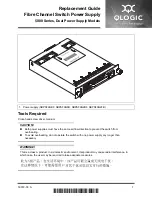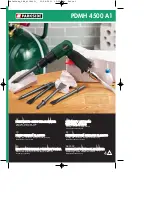
3B Scientific GmbH • Rudorffweg 8 • 21031 Hamburg • Germany •
www.3bscientific.com
Subject to technical amendments
© Copyright 2012 3B Scientific GmbH
•
Never short the fuse or the fuse holder.
•
Never cover the ventilation slots in the hous-
ing. This is necessary in order to ensure suffi-
cient circulation of air required for cooling the
internal components of the equipment.
•
The equipment may only be opened/repaired
by qualified and trained personnel.
2. Description
The AC/DC Power Supply 1/ 2/ 3/ … 15 V, 10 A
provides AC and DC voltages up to 15 V with a cur-
rent up to 15 A.
The AC and DC output voltages are adjustable in
1 V steps and are tapped from the corresponding
output sockets. The DC voltages are stabilised. The
AC and DC outputs are electrically isolated from
each other, and have short circuit protection.
The AC/DC power supply 1008690 is for operation
with a mains voltage of 115 V (
±
10%), and the unit
1008691 is for operation with a mains voltage of
230 V (
±
10%).
3. Technical data
Mains voltage:
see rear of housing
DC output:
1/ 2/ 3/ 4/ 5/ 6/ 7/ 8/ 9/
10/ 11/ 12/ 13/ 14/ 15 V,
max. 10 A
AC output:
1/ 2/ 3/ 4/ 5/ 6/ 7/ 8/ 9/
10/ 11/ 12/ 13/ 14/ 15 V,
max. 10 A
Max. output power:
150 VA
Primary fuse:
see rear of housing
Terminals:
4 mm safety sockets
Dimensions: 170x160x250
mm
3
approx.
Weight:
6.3 kg approx.
4. Operation
4.1 General information
•
Before switching on the power supply, turn the
current regulators fully to the left.
•
Connect the power supply to the experimental
setup.
•
Do not switch the power supply on until the
experiment has been fully assembled.
•
Changes to the experimental setup must only
be made with the power supply switched off.
•
Before switching off the power supply, turn the
voltage regulators fully to the left again.
4.2 Obtaining an AC voltage
•
Connect the load to the AC output sockets (3).
•
Switch on the power supply and adjust the
voltage to the desired value by turning the
voltage regulator (7).
4.3 Obtaining a DC voltage
•
Connect the load to the AC output sockets (1).
•
Switch on the power supply and adjust the
voltage to the desired value by turning the
voltage regulator (6).
4.4 Changing the fuse
•
Turn off the power switch and unplug the
mains plug.
•
Unscrew the fuse holder on the rear side of the
housing with a screwdriver.
•
Replace the fuse and reinsert the holder in its
socket.
5. Care and maintenance
•
Before cleaning the equipment, disconnect it
from its power supply.
•
Use a soft, damp cloth to clean it.
6. Disposal
•
The packaging should be disposed of at local
recycling points.
•
Should you need to dispose of the equipment
itself, never throw it away in normal domestic
waste. Local regulations for the disposal of
electrical equipment will apply.






























